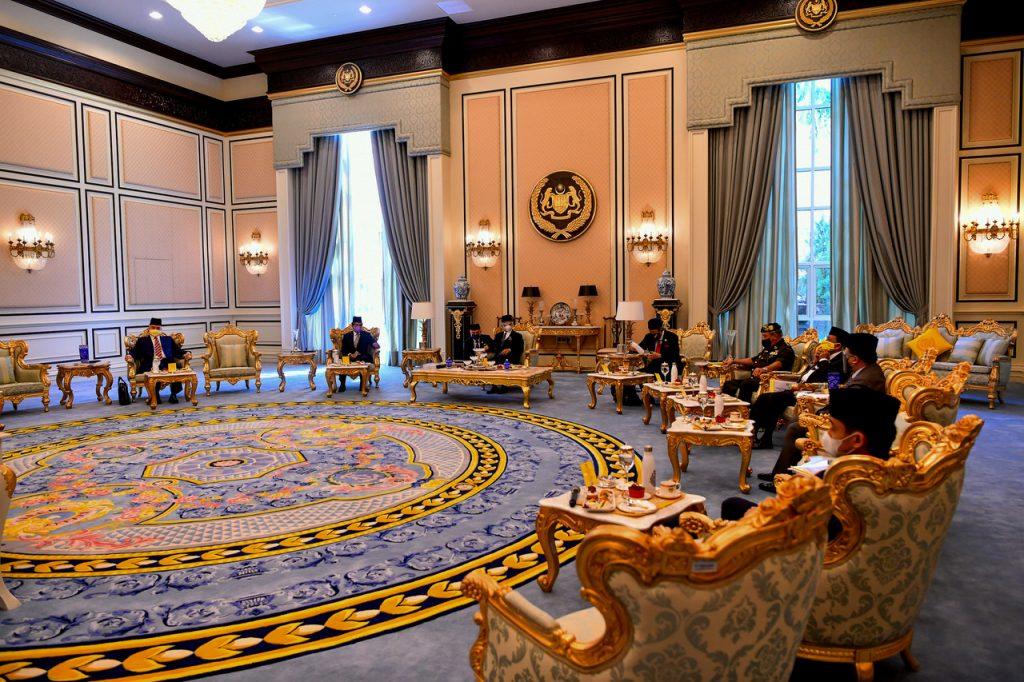Code of ethics signed by Malay rulers 30 years ago draws the line on politics, business and media
The proclamation served as a code of conduct for the royal institution, stating their rights and responsibilities as well as the areas in which they had no say or must abide by the advice of the government of the day.
A landmark proclamation in 1992 by six Malay rulers – five of whom were the fathers of present rulers – had set some ground rules on the conduct of sultans in discharging their constitutional duties, in a document that was drafted with the help of senior Umno leaders at the time, including Anwar Ibrahim.
The Proclamation of Constitutional Principles received the consent of six Malay rulers including then-Yang di-Pertuan Agong Sultan Azlan Shah in July 1992, following a protracted debate on the involvement of the royalty in business as well as perceived interference in politics.
The signing of the proclamation, which was available officially in both Malay and English, was attended by the rulers of Perak, Negeri Sembilan, Perlis and Pahang, as well as then-prime minister Dr Mahathir Mohamad and top Umno leaders of that time including then-party vice-president Anwar Ibrahim, among the Umno leaders responsible for drafting the document.
Anwar at the time welcomed the proclamation as a step forward in strengthening the system of constitutional monarchy.
“Umno and the government’s stand on the position of the Malay rulers and principles of constitutional monarchy have been clarified in the proclamation,” Anwar, currently the PKR president, had said.
Veteran social critic Chandra Muzaffar said it was important to reiterate the contents of the proclamation.
“If after 29 years it has become necessary to reiterate this fundamental principle, it is because some individuals are trying to manipulate the rulers to extricate themselves from issues of right and wrong and to further their own nefarious agendas,” Chandra, who left PKR’s precursor Parti Keadilan Nasional three years after he helped found the party in 1999, told MalaysiaNow.
“The rulers and the people should not allow this to happen for what is at stake is the integrity and viability of the Malaysian nation,” he said.
Strained ties with palace
The proclamation was signed after two years of strained ties between Umno and the palace, following claims of palace interference in Kelantan, as well financial allocations and business projects involving the Selangor palace.
In 1990, the election year in which Umno lost Kelantan to an alliance of PAS and Semangat 46 – the party led by Kelantan royalty Tengku Razaleigh Hamzah – the Umno general assembly heard delegates questioning what they said was the involvement of the Kelantan sultan in party politics.
They were also unhappy with the action of some rulers to vent their displeasure with the government in the media.
“It is clear that in this matter, the rulers in their actions and comments to the media had interfered in matters of state administration which are actually within the jurisdiction of the menteri besar and state executive council members,” members of the Umno Supreme Council wrote in a letter to the Agong in February 1992.
The letter was the result of a series of statements and memorandums from Umno which were critical of the rulers over various incidents involving the royal families of Selangor, Kelantan and Johor.
Some five months after the letter to the Agong, the Proclamation of Constitutional Principles was signed by six Malay rulers, including Sultan Azlan Shah, the Agong at that time.
However, the sultans of Kelantan, Johor and Kedah did not sign the document.
Reminder on powers
For Chandra, the 1992 document is a good reminder for rulers, the Cabinet and the people as a whole.
“It reaffirms the fundamental guidelines that shape the institution of constitutional monarchy, which is one of the cornerstones in the entire system of governance in Malaysia,” he told MalaysiaNow.
“It is crystal clear from their own proclamation that the Agong acts on the advice of the Cabinet at the federal level just as the rulers act on the advice of the state executive councils at the state level. This is in accordance with the Malaysian constitution.”
Key points of proclamation
The proclamation served as a code of conduct for the royal institution, stating their rights and responsibilities as well as the areas in which they had no say or must abide by the advice of the government of the day.
Among others, it specified how sultans were to conduct themselves in matters involving politics and the appointment of the menteri besar, state executive council members and senior government officers, as well as in getting advice from the executive.
“We shall in accordance with the general principle provided in each State Constitution, act on the advice of the State Executive Council or of the Menteri Besar,” the proclamation stated.
On politics, the proclamation made it clear that “we are not directly or indirectly involved in party politics”.
The document also touched on how the rulers would conduct themselves with regards to business activities, expenses of the royal households, religion and the media.
The rulers said they had the right to be consulted and briefed by the menteri besar on the state’s administration as well as to “encourage” and “caution” the government.
But they also pledged not to take their case to the media.
“We, in accordance with constitutional practice, do not disclose to or discuss with the media any matter pertaining to the administration of the State which is likely to give rise to controversy,” the document said.
The rulers similarly pledged to stay out of any business activities except through trustees and nominees.
Click here to read the full text of the proclamation.
Subscribe to our newsletter
To be updated with all the latest news and analyses daily.
